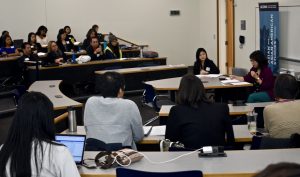
Forum 1:
ASIAN AMERICAN STUDIES FOR THE UNPROGRAMMED: HOW TO BUILD YOUR SHELTER IN THE ACADEMIC STORM
Mai-Linh Hong
Audrey Wu Clark
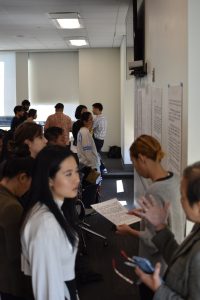
Forum 2:
THE WEE KINGDOMS OF ASIAN AMERICAN STUDIES SEEN FROM HIGH ABOVE IN THE TATTERED AIR BALLOONS OF THE ARTS, OR: SOME WAYS THE SMITHSONIAN APA CENTER AND AALR RE-SEE THE WORK, AND HOMES, OF THE FIELD
Mimi Khúc
Lawrence-Minh Bùi Davis
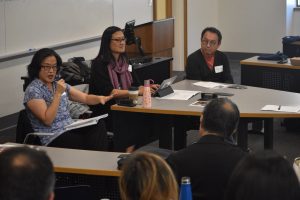
Forum 3:
THE PROGRAM HORIZON: LIMITS AND FUTURES OF ASIAN AMERICAN STUDIES PROGRAMS
Jennifer Ho
Robert Ji-Song Ku
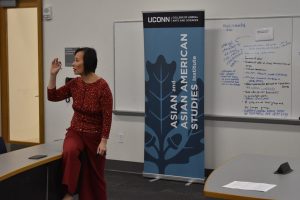
Forum 4:
BUILDING SPACES IN WHICH WE FLOURISH: THE POSSIBILITIES OF EXTRA-INSTITUTIONAL AND TRANS-INSTITUTIONAL COLLABORATION
Tina Chen
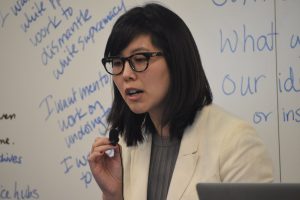
Forum 5:
THE TALKING SYLLABUS: A FORUM ON INTERSECTIONAL ASIAN AMERICAN PEDAGOGIES
Christine Mok
Martin Joseph Ponce
Crystal Parikh
Moderated by Betsy Huang
PROGRAM COMMITTEE
- Jason Oliver Chang (EoC co-chair; jason.o.chang@uconn.edu)
- Betsy Huang (EoC co-chair; bhuang@clarku.edu)
- Michelle N. Huang (EoC Communications Manager; michelle.n.huang@northwestern.edu)
SPONSORS
- University of Connecticut Asian and Asian American Studies Institute
- University of Connecticut College of Liberal Arts and Sciences
- University of Connecticut Humanities Institute
- Clark University Office of the Dean of the College and the Center for Gender, Race, and Area Studies
- Yale University Center for the Study of Race, Indigeneity, and Transnational Migration
EVENT DESCRIPTION
In the autumn of 1992, Professor Robert G. Lee opened the East of California (EoC) Asian American Studies Conference at Brown University with the following welcome.
“...As we watch events from Los Angeles to Rostock, we can not help but feel an even greater urgency in our work of developing Asian American Studies “East of California.” Building on the agenda that was set at the very successful symposium held at Cornell last year we have planned a program that focuses on the institutional building blocks of Asian American Studies. We hope that each of you will be able to take home concrete ideas and information which will help you in building Asian American Studies on your campus.”
The organizing objectives of the EoC network were to a) institutionalize Asian American Studies (AAS), b) develop regional-specific research and publications, and c) provide mutual support to individuals and programs. Historically, the EoC has focused on the institutionalization of the field, supporting student-based movements for the establishment of AAS programs and the professionalization of faculty in those newly minted programs. Twenty-eight years later, the same urgency for the field exists amid cold wars, hot wars, and trade wars. Continuing this tradition, student-based movements fighting for Asian American Studies steadfastly struggle to win faculty lines and establish degree programs on their campuses across the country. The institutional and intellectual landscapes, however, have changed significantly. Victories and defeats in institutionalization have led to challenging and sometimes even toxic work conditions for faculty, previously and newly hired. What other models of development and support can the EoC caucus foster to embrace the work of AAS after the “struggle” or in the absence of it?
For this summit, the EoC committee was compelled by the widespread quandary of a two-sided problem. First, even with the successful creation of AAS centers, programs, institutes, and departments over the last twenty-eight years, many who are east of California still inhabit an institutionally insecure place. These programs wrestle with budget cuts, student recruitment, along with admissions politics and visibility within their institutions that erode interest and viability of the curriculum. Second, AAS has grown to the extent that AAS scholars frequently hold positions in colleges and universities without AAS programs, which can engender isolation and hostile work environments. The focus on program building has left the other lives of AAS scholars and non-program-oriented modes of community building out of focus. It is for this reason that we have organized a summit of programmed and unprogrammed AAS scholars to re-calibrate our community resource models to suit the emergent conditions of AAS in today’s context of EoC.
Drawing from the experiences, models, and strategies developed in programmed and unprogrammed settings, this summit gathers fresh thinking about how to serve existing AAS programs, support AAS scholars faculty outside of AAS programs, and identify other pathways for the work of AAS that are not tied to the pursuit of institutionalization. This summit also aims to comprehend AAS in a broader Critical Ethnic Studies context in which allies and collaborators are differently positioned. Rather than address the key academic conversations that shape our field, the EoC committee reflected on the feedback from members and wider conversations about the state of the field of AAS outside of the Pacific states to pursue a different order of inquiry. To do this work, the summit articulates the stakes of AAS in different spaces. What is the measure of success after institutionalization? To identify the stakes of AAS is to question the survivability of programs and faculty in the contemporary university. With these concerns in mind, this summit hosts five forums, each pertaining to a different debate that AAS faculty, in all sorts of environments, variously confront. Thus the summit de-centers institutionalization and program building to focus on dynamic responses to present concerns and settings of AAS. This collective conversation anticipates the need to address the situation of adjuncts, post-docs, and temporary assignments, the most vulnerable scholars in our field, while also underscoring the strength and vitality of invented communities and creative outcomes in unprogrammed conditions. Framed by these experiences and emergent structures, the summit seeks to renew an imaginative rendering of AAS community building, publishing, and teaching to more effectively communicate the reasons and values of AAS.